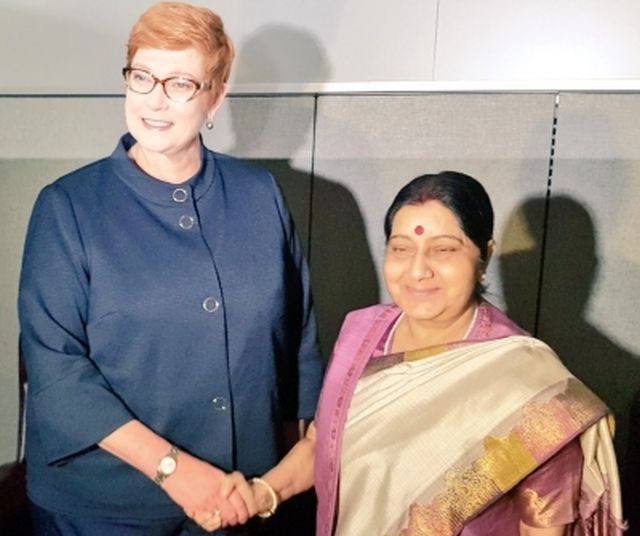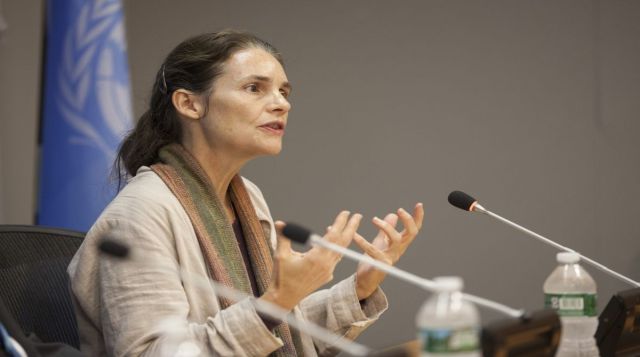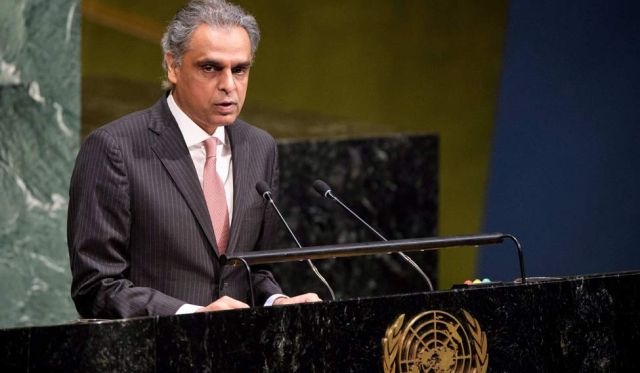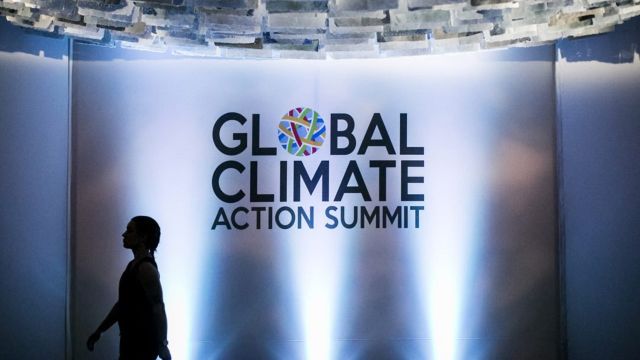
by Editor | May 25, 2021 | Business Summit, Corporate, Corporate Governance, Events, News, Politics, Social Round-up
 By Arul Louis,
By Arul Louis,
United Nations : External Affairs Minister Sushma Swaraj met nine leaders from across the globe in a whirlwind of bilateral interactions and spoke at the Nelson Mandela Peace Summity.
She began her day on Monday by attending the high-level event on counter-narcotics convened by US President Donald Trump, where she was seated at the front row.
India is one of 129 countries that have signed the pledge drafted by Trump on commitment towards international fight against drugs.
Although it was not a formal meeting, she greeted Bangladesh Prime Minister Sheikh Hasina when she came to the UN, India’s Permanent Representative Syed Akbaruddin tweeted.
Sushma Swaraj met the Foreign Ministers of Australia, Spain, Ecuador, Colombia, Mongolia, Nepal, Morocco, Lichtenstein and Federica Mogherini, the European Union (EU) High Representative for Foreign Affairs.
The topics discussed during the meetings with the foreign ministers depended on the relations with those countries and ranged from strategic cooperation to trade and investment.
Meanwhile, Foreign Secretary Vijay Gokhale participated in the Special Meeting of the Conference on Interaction and Confidence Building Measures in Asia (CICA) — a 26-member forum for cooperation in promoting peace, security and stability in Asia.
Ruchi Ghanashyam, the Secretary (West), spoke at the Africa Adaptation Initiative High-Level Roundtable. The organisation aims at facilitating finance and cooperation for the continent’s development.
After Sushma Swaraj’s meeting with Australian Foreign Minister Marise Payne, External Affairs Ministry spokesman Raveesh Kumar tweeted: “Strategic partnership gaining momentum!”
The two countries have been building up their strategic relations reinforced by the Quadrilateral Security Dialogue that includes the US and Japan.
Closer to home was the meeting with Nepal’s Foreign Minister Pradeep Kumar Gyawali, which “took stock of our bilateral relationship”, Kumar tweeted.
At the meeting with Ecuador Foreign Minister Jose Valencia Amores, there were “good discussion on ways to further consolidate bilateral relationship in the areas of trade, agriculture, pharma, IT and capacity building”, according to Kumar.
Also from Latin America, Colombia’s Foreign Minister, the discussions centred on cooperation on trade investment, pharma, mining, petroleum and capacity building, he tweeted.
With Spanish Foreign Minister Josep Borrell, Sushma Swaraj “explored ways to intensify ties in investment, renewable energy, water treatment, tourism and their contribution to our flagship initiatives”, according to Kumar.
Mogherini and Sushma Swaraj “discussed issues related to trade and investment and exchanged views on the regional and global issues,” Kumar said in a tweet.
He noted that India and the EU were bound by a “strategic partnership based on common values of democracy, freedom and rule of law.”
“Celebrating the 25th anniversary of our diplomatic relations” Sushma Swaraj and Lichtenstein Foreign Minister Aurelia Frick “exchanged views on enhancing bilateral relations in trade and investment, particularly through participation at Indian trade fairs and tourism,” Kumar tweeted.
On relations with Morocco, he noted that they stretched back to the time of Ibn Battuta, the 14th century explorer, and tweeted that Sushma Swaraj and “Morocco Foreign Minister, Nasser Bourita discussed strengthening cooperation in areas of commerce, pharma, cyber security, defence and culture”.
She also met with Mongolian Foreign Minister Damdin Tsogtbaatar.
The High-Level General Assembly session begins on Tuesday.
On the sidelines, she was to meet Fiji Prime Minister J.V. Bainimarama and the Foreign Ministers of Iraq, Cyprus, Moldova and Estonia.
(Arul Louis can be reached at arul.l@ians.in and followed on Twitter at @arulouis)
—IANS

by Editor | May 25, 2021 | News, Politics

Sabina Alkire, Director of Oxford Poverty & Human Development Initiative
By Arul Louis,
United Nations : While India has taken tremendous strides in combating poverty in the past decade, Muslims, members of the Scheduled Tribes (ST) and Dalits saw the most progress in in reducing the impact of poverty, according to data compiled in a UN project.
The “very positive trend” during the decade between 2005-06 and 2015-16 in India is that “the poorest are catching up”, Sabina Alkire, Director of the Oxford Poverty and Human Development Initiative (OPHDI), said on Thursday at the presentation of the 2018 Multidimensional Poverty Index (MPI) here.
The MPI prepared by the UN Development Programme (UNDP) and the OPHDI, takes into account various indicators of development rather than just income and aligns them to the UN Sustainable Development Goals, while serving as a measure of the intensity of poverty felt by different groups.
While ST members were still the poorest group, they have seen the fastest reduction in MPI, as have the Dalits, Alkire said.
Explaining it, Diego Zavaleta Reyles from OPHDI told IANS that the average number of deprivations or “the intensity of their poverty” measured by the MPI fell for these groups even though the proportion of poor people in these categories was relatively the same or unchanged.
Between 2006 and 2016, the MPI of the STs came down from 0.447 to 0.229 even though the percentage had fallen only from 79.8 to 50 during the decade, according to OPHDI data.
During the same period, the MPI of Dalits fell from 0.338 to 0.145 while the percentage of poor came down from 65 to 32.9.
“If we look at the religious groups, the Muslims are the poorest and they again had the fastest reduction in MPI,” Alkire said.
While MPI for Muslims was 0.331 in 2006, it fell to 0.144 in 2016, and the percentage of the poor in the community came down from 60.3 per cent to 31.1 per cent.
Nationally, 54.7 per cent of the people in all groups taken together were poor in 2006, but only 27.5 per cent in 2016, and the MPI came down from 0.279 to 0.121, the data show.
In terms of numbers, 271 million people had moved out of poverty during the decade, with the number of poor people coming down 635 million in 2005-06 to 364 million according to the MPI standards.
But “we are seeing a shift of global proportions occurring in India over a ten-year period and that is really encouraging”, Alkire said.
India is the only country for which changes of this magnitude are taking place at this time, she added.
Bihar remains the poorest state, but along with other high-poverty states – Jharkhand, Madhya Pradesh, Uttar Pradesh and Chhatisgarh – had the fastest reduction in multi-dimensional poverty, she said.
In spite of the progress, these states still remain the poorest.
Among age groups, children, who are still the poorest, saw the fastest reduction in MPI, she said.
Such reduction in poverty among these groups or states did had not happened in India in the earlier periods according to a previous study for the period 1998-1999 to 2005-06, she said.
UNDP Administrator Adam Steiner said that when governments start looking carefully at who the poor are and where they are, the analysis leads to programmes that help the poorest of the poor, whether by ethnicity, religion or geography, and results like those in India can be achieved.
Traditional poverty measures – often calculated by numbers of people who earn less than $1.90 a day – shed light on how little people earn but not on whether or how they experience poverty in their day-to-day lives, according to UNDP.
On the other hand, MPI takes into account health, education and living standards in areas like access to clean water, sanitation, nutrition and primary education, with those lacking in at least a third of these defined as multi-dimensionally poor.
According to the income-based measurement, only 270 million Indians are considered poor but according to the MPI standards a far larger number – 364 million — were categorised as multi-dimensionally poor in 2016.
(Arul Louis can be reached at arul.l@ians.in and followed on Twitter at @arulouis)
—IANS

by Editor | May 25, 2021 | Corporate, Corporate Governance, News, Politics

Syed Akbaruddin
By Arul Louis,
United Nations : India has criticised the world body for not doing enough to cut off the drug trade that is financing the Taliban with over a billion dollars as it continues its military operations with the support of Afghanistan’s neighbour.
Terrorist organisations operating in Afghanistan “benefit significantly from criminal networks operating drug cartels and stealing Afghanistan’s natural resources”, India’s Permanent Representative Syed Akbaruddin told the Security Council on Monday during a debate on the situation there.
“The opium produced in Taliban-controlled areas is estimated to account for 85 per cent of global illicit production, valued between $1.5 billion to $3 billion,” he said.
“By some estimates, 60 per cent of the Taliban’s revenues are from the drug trade. Poppy cultivation is said to be the largest cash crop in Taliban-controlled areas,” he added.
Yet the UN has not given adequate attention to the drug trade that is financing the Taliban and other terrorist organisations, Akbaruddin said.
While a Security Council resolution earlier in 2018 focused on the nexus of terrorism, drugs and illegal exploitation of natural resources in Afghanistan, it fell “short of expectations in striving to cripple the Taliban’s drug trade”, he said.
Secretary-General Antonio Guterres’ current report “also fails to address this very key issue in an adequate manner”, he added.
Akbaruddin cited the experience of combating the Islamic State in Iraq and Syria where international action cut off its oil trade, reducing it by about 90 per cent, from about $50 million per month to $4 million, over three years.
This successful international campaign against the Islamic State should be replicated in Afghanistan against the Taliban’s drug trade, he said.
Without mentioning Pakistan by name, Akbaruddin hit out against Islamabad for providing safe havens for terrorists to plan and carry out their attacks.
“These sanctuaries have, for years, provided safety for the dark agendas of ideologically and operationally-fused terror networks like the Taliban, Haqqani network, Daesh, Al Qaeda and its proscribed affiliates such as the Lashkar-e-Taiba and Jaish-e-Mohammed,” he said.
Akbaruddin said that India was committed to helping Afghanistan and its “focus remains on the economic pillar of stability and reliable connectivity”.
He said: “We strongly believe that lack of connectivity directly impacts the economic, security and political situation in Afghanistan and we want to address this crucial issue for the benefit of the Afghan people.”
India’s efforts to open a sea link for Afghanistan through the Chabahar port, which it is developing in Iran along with road and rail links for Afghanistan, is in peril because US President Donald Trump has reimposed sanctions on Tehran.
If India is not able to use the port or develop it further, it would seriously set back the connectivity that Afghanistan badly needs for its economic growth.
(Arul Louis can be reached at arul.l@ians.in)
—IANS

by Editor | May 25, 2021 | Business Summit, Events, World
 By Vishal Gulati,
By Vishal Gulati,
San Francisco : Top UN officials welcomed the outcomes of the Global Climate Action Summit that concluded here on Friday, showcasing a surge of climate action and commitments from regions, cities, businesses, investors and civil society; and calling on governments everywhere to step up their efforts to tackle climate change.
Leaders from all sectors of society gathered at the event to demonstrate how they are taking ambition to the next level with a wave of fresh and brave climate action announcements that, if implemented, will generate over 65 million new, low-carbon jobs by 2030.
“We are experiencing huge economic losses due to climate change,” said UN Secretary-General Antonio Guterres.
“But the Global Climate Action Summit has brought together actors demonstrating the vast opportunity afforded by climate action. They are betting on green because they understand this is the path to prosperity and peace on a healthy planet.”
This momentum culminated in a landmark Call to Action, which was presented to UN’s Envoy on Youth Jayathma Wickramanayake in a symbolic gesture to illustrate that it is future generations who will be most affected by the decisions of the current generation to build a better, more resilient world.
Accepting the Summit’s Call to Action on behalf of the United Nations, UN Climate Change Executive Secretary Patricia Espinosa said: “This Summit and its Call to Action make an important contribution towards achieving our collective goal: to keep global temperatures to 1.5 degrees Celsius in line with the Paris Agreement.”
“It will encourage governments worldwide to step up their actions, demonstrating the vital role that states and regions, cities, companies, investors, and civil society are playing to tackle climate change.”
The event took place against a background of accelerating impacts of climate change, including Super Typhoon Mangkhut expected to make landfall on Saturday and Hurricane Florence, which continues to devastate communities on the east coast of the US.
The UN Environment highlighted the vital role of non-party stakeholders in propelling the global fight against climate change forward, in an excerpt of their Emissions Gap Report launched at the Summit.
“Climate change is undoubtedly the defining issue of our time, and working together across nations, organizations and communities is the only way that we can tackle this enormous task and seize the huge opportunities,” said head of UN Environment Erik Solheim.
“We have seen here over the past few days the inspiring amount of work that is already being undertaken by communities around the world to address these issues. If we manage to put our environment first, we can come out on the other end of this formidable challenge and achieve our common goal, a sustainable world for all.”
Espinosa’s speech at the closing ceremony underscored the need for all actors to embrace ‘inclusive multilateralism’, strongly mirroring the UN Secretary-General’s remarks on Monday in New York, where he called on leaders to adopt a sense of urgency to deliver a decisive response to climate change.
This spirit of collaboration is in keeping with the history of San Francisco, which witnessed the signing of the UN Charter in 1945, first establishing a rules-based international order that championed multilateralism over self-interest, and endorsed progress not through conflict, but through all people working together.
Over the last three days, Californian Governor Jerry Brown has played host to an official programme of events that generated more than 500 commitments.
Participants used these events to unveil new commitments under five challenge areas — healthy energy systems, inclusive economic growth, sustainable communities, land and ocean stewardship, and transformative climate investments — captured in the Summit’s final communique and registered on UN’s revamped Climate Action Portal — aimed to send a strong signal to governments to step up action by 2020, when global emissions need to peak and then swiftly decline.
(Vishal Gulati is in San Francisco at the invitation of the Climate Trends to cover the Global Climate Action Summit (GCAS). He can be contacted at vishal.g@ians.in)
—IANS

by Editor | May 25, 2021 | Muslim World

Mahmoud Abbas
Ramallah : Palestinian President Mahmoud Abbas said on Saturday that he will address the upcoming UN General Assembly on issues causing suffering to Palestinians.
Abbas made the remarks during a meeting he chaired for Palestine Liberation Organization (PLO) Executive Committee at his office in the West Bank city of Ramallah, Xinhua reported.
“We will go to the United Nations to confront the world with the issues that our people are suffering,” said Abbas, who is scheduled to deliver a speech at the UN headquarters in New York on September 27.
The addressed issues include the Israeli decision to demolish Al-Khan Al-Ahmar Bedouin village east of Jerusalem, and the status of Al-Aqsa Mosque in the holy city, he added.
“We are consulting with our brothers in Jordan to form a unified position to go to the International Criminal Court and the International Court of Justice on what is going on at the Al-Aqsa Mosque,” Abbas noted.
The Palestinian President said the final decision will be made by the PLO central council after he returned from the UN assembly.
The United States and the Palestinians have almost severed ties since US President Donald Trump declared Jerusalem as the capital of Israel on December 6, 2017.
—IANS





